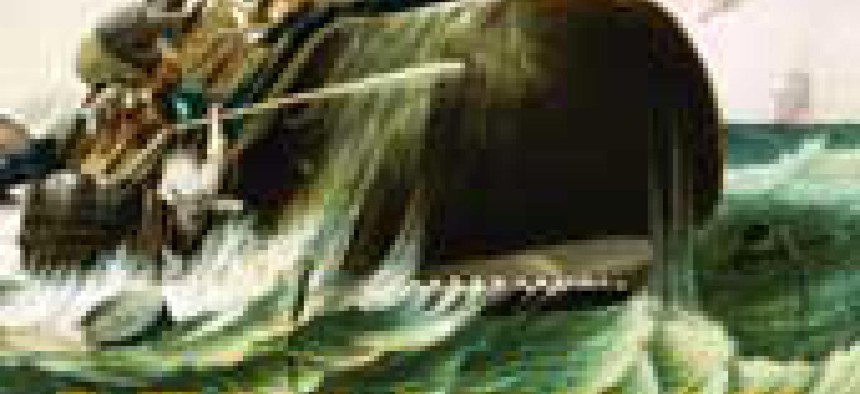History and a whale of a story

A conversation with Eric Jay Dolin, whaling historian.
One hundred years ago, the whaling industry in the United States was in its death throes. Petroleum products had largely replaced whale oil as a source of lubricants and illuminants. By 1924, the nearly 300-year history of American whaling was over.For author Eric Jay Dolin, that rise and long fall provided rich material for his new book, "Leviathan: The History of Whaling in America" (W.W. Norton). The book recounts a major U.S. industry that most people only know about from Herman Melville's "Moby Dick."Dolin spoke recently with Editor Nick Wakeman about leadership, whaling and the relationship between whaling and the discovery of oil in Pennsylvania. It's an American story about entrepreneurship, exploration, good times, bad times, economic failure and success. It's about business acumen and exploitation of a natural resource.What sparked me to explore this topic was one fact ? that before the Revolutionary War, whaling was the single largest source bringing British sterling to New England. It was even larger than cod.Something we take for granted is illumination, but 150 years ago, before Drake's oil well and kerosene, major cities around the world were lit by whale oil. It was a fundamental product. Absolutely, but it was a long, painful death, starting in the 1850s and going all the way to the 1920s.When petroleum was discovered, a lot of the need for whale oil withered away. But at that time, feminine fashion changed. The hourglass figure came into vogue. All of a sudden, baleen [thick hair-like structures in whales' mouths used to filter food] became incredibly valuable as stays for corsets.There was a gold rush for the Arctic region for bowhead whales, which have the longest baleen. The price skyrocketed in the 1890s and kept many whalemen in business.But in 1907, a French designer, Paul Poiret, introduced the slimmed-down fashion, and overnight, corsets were not in demand and the market for baleen collapsed. That's one of the lessons. You need to know when to find another line of work. As the whaling industry started to fall apart, a lot of very savvy whaling merchants took their profits and invested in other up-and-coming industries, such as cotton and textiles and the petroleum industry.After oil was discovered in Pennsylvania and the oil rush was on, a lot of the men who went to Pennsylvania and Ohio were ex-whalemen. To make a risky venture work, you have to have a solid, competent core of leadership because the profits of the entire voyage are based on that. You need to be firm and keep costs to a minimum to make your voyages profitable, but you shouldn't do that at the expense of the men upon whom you depend for a successful voyage. If you treat them too poorly, you'll get your just desserts ? mutinies, mass desertions ? all these things take away from the bottom line. The captain had to make quick and good decisions, and he had to instill confidence in the people following him.If you had a wishy-washy captain, it was a recipe for disaster. Some of the other characters on board would take advantage of that weakness, and that led to things like mutinies or just miserable voyages where nothing worked well.The captains who suffered the mutinies either ruled with too much of an iron fist and meted out punishment that was way too severe or they didn't rule at all, which was almost as bad.The captain was an important element for the owners of the ships because the last thing they wanted was a weak leader in charge of their assets far from their home port.A captain can't ask the owner, "What should I do?" The captain had to think onhis feet.


Q: What do you hope people will learn from your book?
Dolin:
Q: Did whalers realize their industry was dying?
Dolin:
Q: Did whalemen readily adapt?
Dolin:
Q: What else can we learn from whaling?
Dolin:
Q: What special skills did the captain need to have?
Dolin:
For more information on "Leviathan: The History of Whaling in America," go to www.ericjaydolin.com.

"The captain had to make quick and good decisions, and he had to instill confidence in the people following him." Eric Jay Dolin

Q: What do you hope people will learn from your book?
Dolin:
Q: Did whalers realize their industry was dying?
Dolin:
Q: Did whalemen readily adapt?
Dolin:
Q: What else can we learn from whaling?
Dolin:
Q: What special skills did the captain need to have?
Dolin:
For more information on "Leviathan: The History of Whaling in America," go to www.ericjaydolin.com.
NEXT STORY: Picture this: Operation homefront

